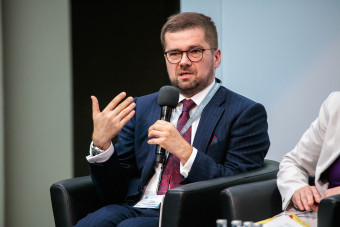Interreg should become more flexible and simpler again
A panel of experienced policy makers agreed at the Interreg CENTRAL EUROPE conference in Berlin on 21 September that future Interreg programmes should become thematically more flexible again. They confirmed that cooperation is an important instrument for fostering European integration and territorial cohesion and explored options to make it easier to implement projects on the ground.

Pictured: Paweł Chorąży, Undersecretary of State of the Polish Ministry of Economic Development
Speaking at the Interreg CENTRAL EUROPE 20-year anniversary conference, Paweł Chorąży, Undersecretary of State of the Polish Ministry of Economic Development, said that "thematic concentration does not seem to be the most relevant mechanism for Interreg." More flexibility should be given to the funding instrument again in the next programming period after 2020.
After 20 years of successful transnational cooperation in central Europe, Interreg is anything but out of fashion, assured Moray Gilland, Head of Unit for Policy Development and Economic Analysis at the European Commission's Directorate General for Regional and Urban Policy.
In view of the debate about the future of EU cohesion policy, Gilland showed himself convinced that Interreg as a whole and transnational cooperation in particular will be there in the future despite challenging budget and policy negotiations ahead. Interreg CENTRAL EUROPE in his view is a pragmatic and functional programme that has well demonstrated its relevance and results during the past years.
Katharina Erdmenger, Head of Division for European Spatial Development Policies and Territorial Cohesion in the German Federal Ministry for Transport and Digital Infrastructure, emphasised the value of Interreg cooperation for macro-regions: "If you look closer at what actually works in macro-regional strategies, it is Interreg projects." However, the value of Interreg goes far beyond that contribution, she added. The programmes themselves take a strategic, territorial approach to developing their specific territories.
The topic of simplification was brought into the debate by Pavel Lukeš, Head of Unit for International Interrelation in the Czech Ministry of Regional Development and current Chair of the Interreg CENTRAL EUROPE Monitoring Committee. He suggested a series of measures to make lives of both programmes and projects easier. Ideas included a simplification of audit rules for Interreg, a simplification of financial rules to allow advance payments to beneficiaries and an exemption of Interreg from State aid.
Paweł Chorąży, who is also member of the European Commission's High Level Group monitoring simplification for beneficiaries of ESI Funds, emphasised that changes in legislation and audit philosophy are needed but that they will not be sufficient for cutting red tape. Supported by Moray Gilland from the European Commission, he said that also programmes will have to take more responsibility and stop being over-prudent, which often results in gold plating. Katharina Erdmenger warned, however, that this might not be so easy because Interreg programmes and ultimately their projects have to deal with a regulatory logic that was designed for mainstream programmes and not for cooperation.
The Interreg CENTRAL EUROPE 20-year anniversary conference was livestreamed and a video recording is available on the programme's YouTube channel.
Contact
Interreg CENTRAL EUROPE
Joint Secretariat
Kirchberggasse 33-35/11
A-1070 Vienna
Phone: +43 (0) 1 8908 088 - 2411
E-mail: info@interreg-central.eu
